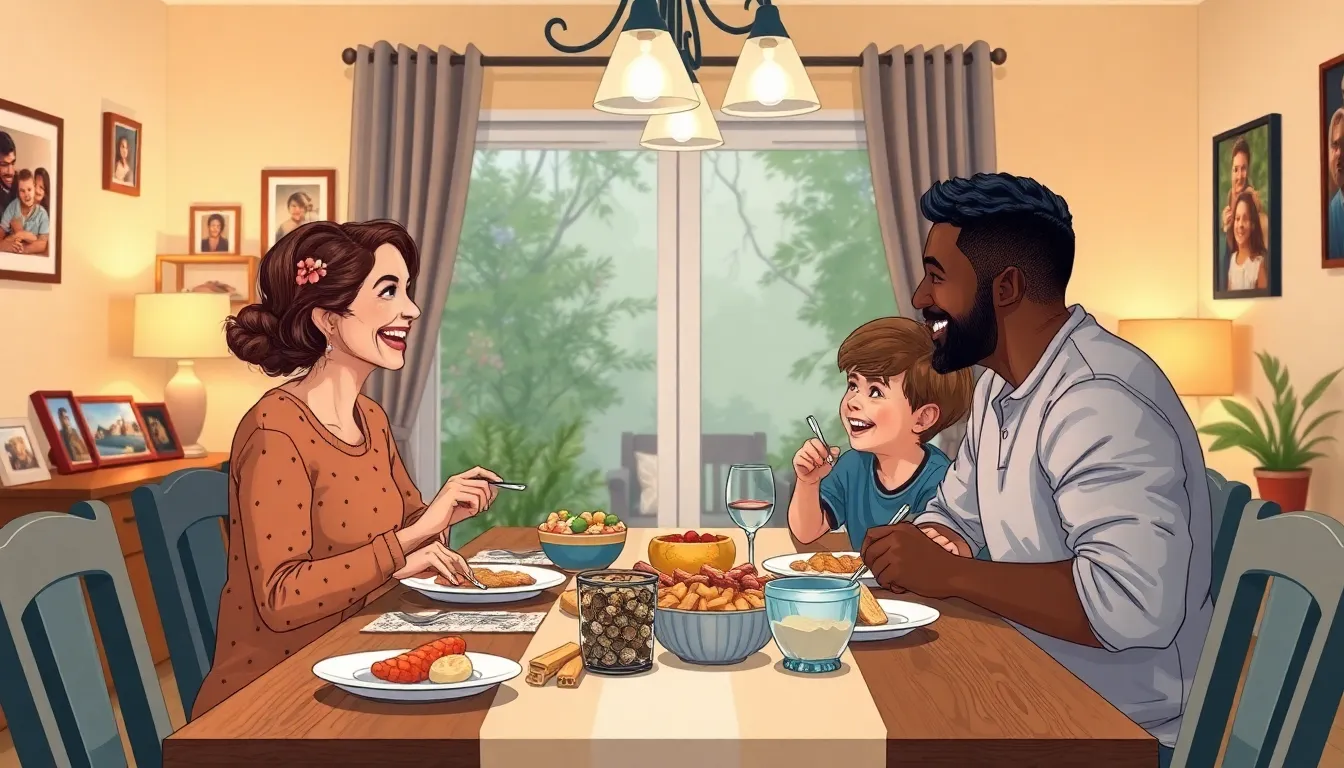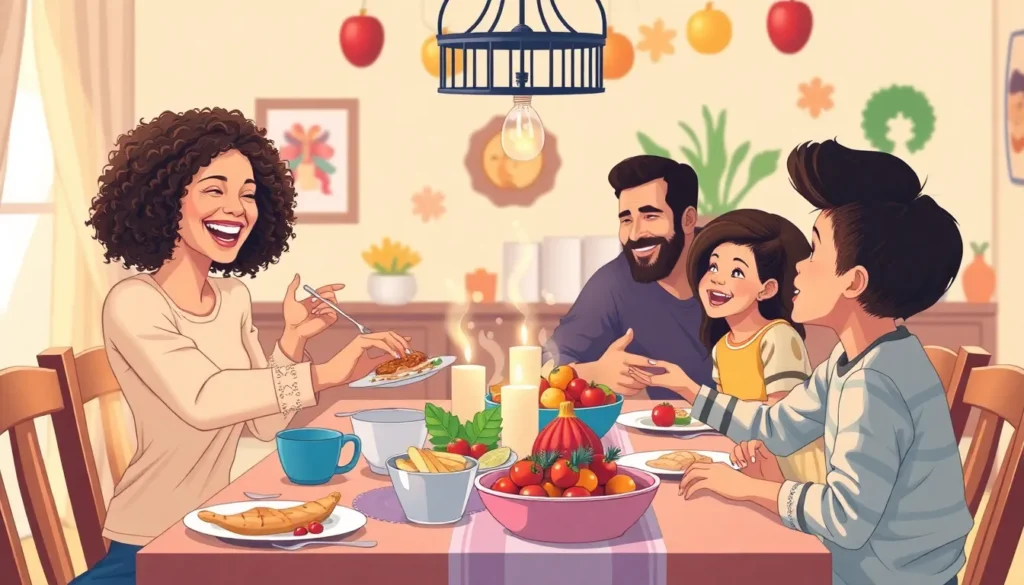Family traditions are the glue that holds loved ones together, often creating memories that last a lifetime. From quirky holiday rituals to weekly game nights, these unique practices shape a family’s identity and foster a sense of belonging. They’re the stories passed down through generations, often accompanied by laughter, eye rolls, and perhaps a few secret family recipes that are never quite as good when made by outsiders.
But what exactly defines a family tradition? It’s not just about the annual turkey trot or the holiday movie marathon. It’s the little things that make each family special, the traditions that spark joy and sometimes lead to hilarious mishaps. Dive into the world of family traditions and discover how these cherished customs can strengthen bonds, create laughter, and ensure that the family legacy lives on—one slightly embarrassing moment at a time.
Table of Contents
ToggleUnderstanding Family Traditions
Family traditions encompass the practices and customs that families consistently embrace over time. These traditions often nurture connections and memories among loved ones.
Definition of Family Traditions
Family traditions refer to recurring events or rituals that families engage in regularly. Examples include weekly family dinners, holiday celebrations, or unique practices developed by family members. These traditions often embody shared values, beliefs, and history, reinforcing family identity across generations.
Importance of Family Traditions
Family traditions play a crucial role in fostering connection and unity among members. Shared experiences create lasting memories that families cherish. They provide stability during times of change, helping families bond and navigate challenges together. Celebrating traditions can also enhance a sense of belonging, as members feel part of something greater. By participating in rituals, family members deepen their relationships, contributing to emotional support and resilience.
Types of Family Traditions

Multiple types of family traditions exist, each contributing to the family’s unique fabric. Rituals and celebrations as well as everyday practices play a critical role in shaping these traditions.
Rituals and Celebrations
Rituals and celebrations include annual events like birthdays, holidays, or reunions. Families often recognize significant milestones with specific traditions, such as special meals or ceremonies. For example, many families exchange gifts during holidays, reinforcing bonds through shared joy. Each celebration strengthens family connections and creates lasting memories filled with laughter. Participating in these traditions sparks a sense of belonging, making each member feel valued and included.
Everyday Practices
Everyday practices encompass the small, consistent actions that families share. Routine activities like family dinners, game nights, or bedtime stories form the backbone of daily life. These simple gatherings cultivate closeness among family members, fostering communication and understanding. Engaging in these practices allows families to share experiences and build narratives unique to them. Ultimately, everyday rituals create a welcoming atmosphere, ensuring everyone feels at home.
How Family Traditions Are Formed
Family traditions develop through shared experiences and values that unite family members. Families often create traditions based on cultural, religious, or personal influences that resonate with their unique identities.
Influences on Family Traditions
Cultural background significantly impacts family traditions. For example, families from Hispanic cultures may celebrate Día de los Muertos, while those with Native American heritage might observe specific ceremonies. Religious beliefs also shape traditions, like attending church services during holidays. Personal experiences, such as a family’s unique story or shared hobbies, often lead to new practices, such as game nights or themed dinners. These influences combine to form distinct customs that reflect a family’s values and history.
Evolution Over Time
Traditions are not static; they can evolve as families grow and change. New members often introduce fresh ideas or adaptations. For instance, a couple may blend their cultural practices into new rituals during holidays. Changing circumstances, like relocation or the loss of family members, can also reshape traditions. Over time, some activities may fade while new ones emerge, ensuring that traditions remain relevant and meaningful. Adaptations help families stay connected, allowing them to embrace both the old and the new in their shared experiences.
Benefits of Maintaining Family Traditions
Maintaining family traditions offers numerous benefits that enhance familial relationships and create a sense of belonging. These customs provide a reliable connection among family members.
Strengthening Family Bonds
Family traditions significantly strengthen bonds among relatives. Families that participate in regular gatherings, such as game nights or holiday meals, experience increased closeness. Engaging in shared activities creates an environment of trust and support. Additionally, traditions often promote open communication, allowing family members to express themselves freely. New members often feel welcomed as they join existing customs, enhancing feelings of acceptance. Ultimately, these practices cultivate stronger relationships, ensuring family members feel valued and understood.
Creating Lasting Memories
Creating lasting memories becomes effortless through family traditions. Recurring events like annual celebrations or themed dinners foster unforgettable experiences. Families often recount stories stemming from these shared moments, reinforcing their unique identity. Engaging in consistent rituals provides a sense of continuity, helping children remember their heritage and family history. As individuals look back on these cherished experiences, they often reflect on the joy and love present during these gatherings. These memories form an emotional foundation, offering a source of strength during challenging times.
Family traditions play a vital role in shaping relationships and creating a strong sense of belonging. They offer opportunities for families to connect through shared experiences and values, fostering unity and emotional support. Whether through unique rituals or everyday practices, these traditions enrich family life and create lasting memories.
As families evolve, so do their traditions, allowing for new experiences while honoring the past. Embracing both the old and the new ensures that these customs remain relevant and meaningful. Ultimately, nurturing family traditions not only strengthens bonds but also cultivates a legacy filled with joy, laughter, and resilience that can be passed down through generations.



